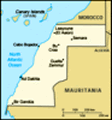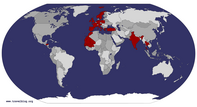Advertisement
Published: December 3rd 2007
The train ride (see
The Train Ride) had left me dreary and adrenaline-less. In Nouadhibou I took lodge at a camp for overlanders and after a much needed resting day I begun my quest for a ride north, through Western Sahara and up to Marrakech, where a flight destination London awaited me. I had bought the ticket over a month earlier, still in Mali, but I had obviously underestimated both width and slowness of Africa. Now all I had got were a mere six days to find someone willing to give me a lift up to Dakhla (600 kms of desert), and from there to proceed on to Marrakech, some 1500 kms further north.
A word of wisdom for those of you who are thinking about crossing the Sahara with no private vehicle: do it from north to south. The few adventurous jeep or truck drivers I met in Nouadhibou were invariably headed to Nouackchott, none travelling the opposite direction. Everyone moving from Europe to the heart of Africa. There was something illogical in all this: if so many travel south, sooner or later someone has to come back, isn’t it? But no. It seems that the vast majority of those who
cross the Sahara by car, sell the vehicle as soon as the journey is completed and return to Europe by plane. The discovery of this costume projected a very discouraging shadow over my plan.
Resigned to not be able to find any overlander’s caravan to join in, I began to mentally browse through the narrow maze of remaining options. The first alternative idea was to try to get a lift on a truck heading to Europe. I was -so had I reasoned- in an important fish trading area. The port of Nouadhibou is disconcerting: heaps of rotting fish all over the place and hunchbacked men in traditional clothes manually loading and unloading cargo from the harboured ships. The road that passes through the port, the only one that would really makes sense to tar in a totally desert country, is just a track of earth and mud turned into a ploughed field by the continuous truck traffic. I boarded every truck with an European plate and asked the driver (all Mauritanians) if they were heading to Spain. All were going south instead, to Nouackchott.
In one of these raids of mine in the not too recommended port area,
I met Juan Manuel, a Canarian businessman who explained me that the only fish unloaded here is that little percentage needed for local consumption and that the biggest part travels directly by sea to the Spanish ports. What sense would make, anyway, to unnload it here and then transport it to Europe by trucks through the whole of two countries and a desert? He advised me, instead, to try my luck at the fruit market with Moroccan traders. These transport fruits and vegetables from southern Morocco to Nouadhibou, unload the goods, retrieve the empty cases and repeat the trip the other way round. Getting a lift here would be easier albeit, very likely, in return for some money. But I was in too much haste to be able to afford philosophical purisms on the art of hitchhiking. I had already wasted two of the six days I got and I hadn’t advanced a meter. So I paid a visit to the market. I spread the rumour that I was looking for a lift to Morocco and left the address where they could contact me. And then it was wait and hope.
At 7 next morning I was woken up
by the camp caretaker; a Moroccan fabric trader would be leaving for Dakhla at noon and he seemed to be willing to take me along in return of 9000 ouguya, 27 €. Such hefty request put me on the brink of rejecting the offer, but I wasn’t really in a good position to bargain.
Shortly before 12, Mr. Rachid showed up on his white Renault Combo at the camp gate. I will remember the rest of that day as one of the longer and more monotonous trips of my life: 600 kms of sand, rocks and wind. The only happenings worthy of note in such an uneventful journey was the crossing of the no man's land between the two countries, home of a lively and disturbing market of second hand cars of dubious origin and then, once entered Western Sahara, the continuous warnings not to stray from the tarred road because of landmines. Oddly enough, the signs were located not only on the desert side, but also on the ocean front. Do the Moroccan army fear an invasion from the sea by
Polisario Front? Amphibian camels, maybe?
We reached Dakhla at sunset. Rachid dumped me in the city
main square and finally, four months after leaving Canary Islands, I found myself in a city where chaos and garbage did not represent normality. I don’t think there is any reason why someone would specifically want to come and visit Dakhla, but after fleas, mosquitoes, mice, iron dust and a monotonous diet, you would appreciate it like Venice in honeymoon. It reminded me the island of Fuerteventura: same low profiled and terraced houses, same persisting and surfer friendly wind, same waterfront with tiles creating ocean inspired designs, same number of Moroccans. Seeing young couples strolling arm in arm or groups of sole girls also helped to forget the absurd Mauritanian feudal-religious anachronisms. I would have happily stayed longer but I only had three days left to cover the remaining 1500 kms to Marrakech.
Laayoune, larger, more crowded and less clean that Dakhla, was my next stop. I was in such delay on the schedule that I could not linger too long here either. In the end I only stayed for one day. At night, while walking towards the bus station to get on the bus that would finally lead me to Morocco, I was involuntarily involved in an ugly
scene of social intolerance. Two girls were strolling along one of the city centre crowded streets, one was wearing the Islamic headscarf, the other was bare headed. A brute approached and began to talk to them. A monologue the two girls were apparently very keen to escape from. I was still far, but proceeding in the opposite direction I could observe the continuous zigzagging of the women trying to get rid of these unwanted attentions from such an unorthodox admirer. The man, indomitable, kept hassling them, among the general indifference of passers-by. I stopped, I wanted to live the whole scene. Continuing with their crisscross walking, the trio finally reached the spot I was standing in. Seen from close, distress and powerless anger were clearly marked on the two women’s faces. No one intervened. Indifference in its purest form, just as happens in any western country when an elder lady boards a full bus or train and nobody gives his seat away. These heartless behaviours make my blood boil up. I’m no hero and probably the day I assisted to an act of group violence I would turn my head away and pretend not to see only to spend the
rest of my days -elongated by a moment of cowardice- in self recrimination. But in this case it was just one man, not the whole Hell’s Angels headquarter.
I shouted to the man, in French, to leave them alone. The three of them froze. He turned to me, said something in Arabic (doubts about the morality of my mother’s profession, I suppose) and was approaching with threatening attitude. But things had changed, the balance of power had reversed and one of the two women, evidently reassured by the presence of an unexpected ally, finally found the strength to face -waving an index finger to him- her tormentor. Meanwhile, others had stopped by and a man arm in arm with his wife began to echo the young woman in her reproach to the former executioner, now victim. The fella quickly understood how bad things were turning for him, made haste to pull out of the group and vanished. Attract the attention of a police or army patrol (here in Laayoune there are thousands for political reasons) would have probably meant for him to be brought to the police station where the law would have vigorously explained him that in Morocco a blind eye can be turned on the lack of respect for a bare headed woman but that picking a fight with a tourist is totally unacceptable.
Handshakes, thanks and on the road again I was. Another sleepless, landscape-less night across this endless, ochre expanse which is the Sahara. Towns were are all the same albeit now at less abysmal distances from each other than in the south. Then came the first coastal cities: Sidi Ifni, Agadir, Essaouira. It's always funny to see such a large slice of world from a bus window. One doesn’t live it, just observe it superficially as if seated in front of a TV. And finally it was Marrakech, one of those cities which name calls to mind exoticism and stories from
One Thousand and One Nights. I was totally worn out. Over a week I had done nothing but move direction north in complete apnoea. I toiled as a coal miner to cover just over 2000 kms. The last ones of my time in Africa.
ITALIANO La versione italiana di questo blog la trovi sul sito Vagabondo.net
Link:
Guida Desertica per gli Autostoppisti
Advertisement
Tot: 0.407s; Tpl: 0.013s; cc: 42; qc: 162; dbt: 0.2479s; 1; m:domysql w:travelblog (10.17.0.13); sld: 1;
; mem: 1.6mb













Falc
JT
Our hero
Bravo! You did good... and saw that all it takes is that one voice crying out against the tyrant, and others quickly join in, rendering him impotent. (Would that it worked with George Bush!) (Of course, he could also have pulled out a knife and gutted you, were he a madman, so choose the time and place of your battles as well as the means of fighting them, but... :) ) I was looking for info on traveling from Agadir to Senegal.. and this about the Sahara is promising... though the rest of it makes the $450 USD they want from Royal Air Maroc seem like it may be a sensible choice. I'd miss some rich memories, but even in January, Western Sahara sounds a bit like a new kind of hell. Perhaps I should explore that after I've got a base settled on in Dakar? Thanks for sharing the info. It's a disappointment to realize you're headed back, as it seems you'd have been a good travel companion for a bit along the way. In Mali, did you happen across any of the Toureg tribes and their Azawakh dogs?